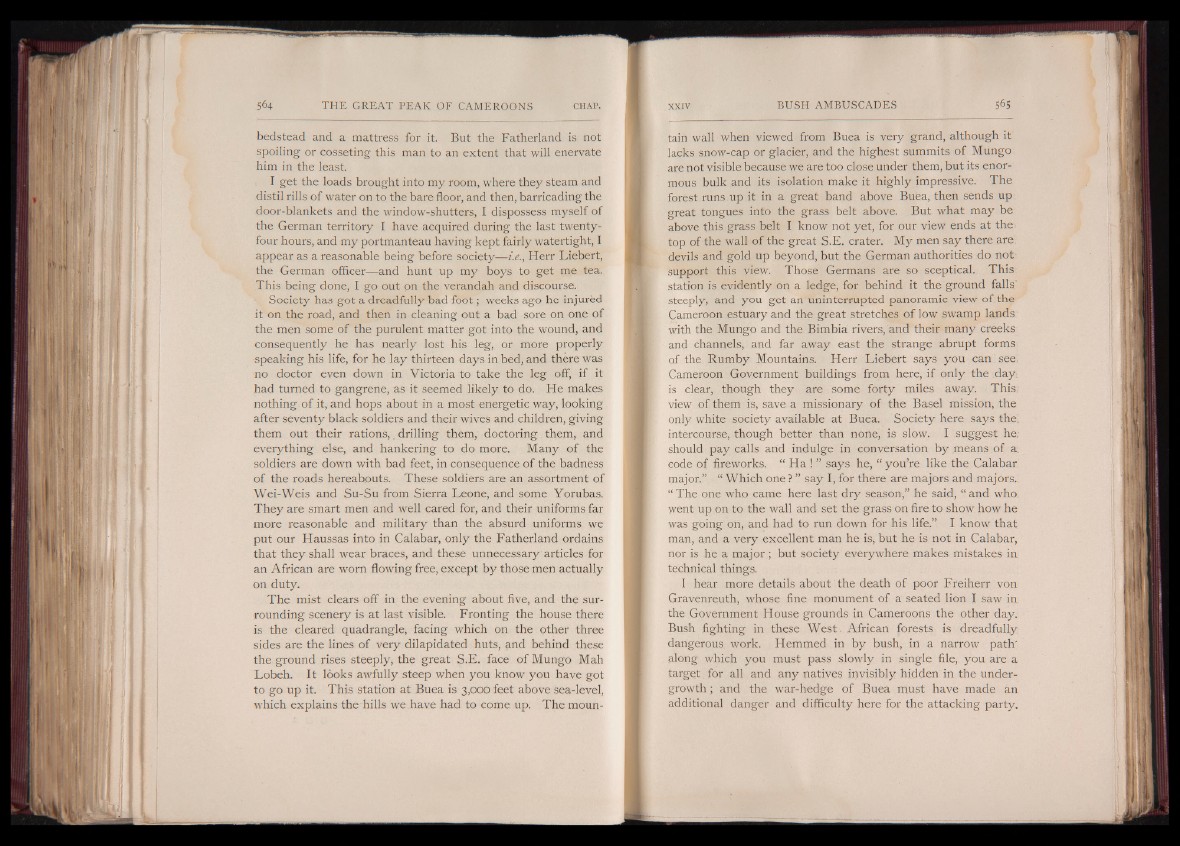
bedstead and a mattress for it. But the Fatherland is not
spoiling or cosseting this man to an extent that will enervate
him in the least.
I get the loads brought into my room, where they steam and
distil rills of water on to the bare floor, and then, barricading the
door-blankets and the window-shutters, I dispossess myself of
the German territory I have acquired during the last twenty-
four hours, and my portmanteau having kept fairly watertight, I
appear as a reasonable being before society— i.e., Herr Liebert,
the German officer— and hunt up my boys to get me tea.
This being done, I go out on the verandah and discourse.
Society has got a dreadfully bad foot; weeks ago he injured
it on the road, and then in cleaning out a bad sore on one of
the men some of the purulent matter got into the wound, and
consequently he has nearly lost his leg, or more properly
speaking his life, for he lay thirteen days in bed, and there was
no doctor even down in Victoria to take the leg off, if it
had turned to gangrene, as it seemed likely to do. He makes
nothing of it, and hops about in a most energetic way, looking
after seventy black soldiers and their wives and children, giving
them out their rations,. drilling them, doctoring them, and
everything else, and hankering to do more. Many of the
soldiers are down with bad feet, in consequence of the badness
of the roads hereabouts. These soldiers are an assortment of
Wei-Weis and Su-Su from Sierra Leone, and some Yorubas.
They are smart men and well cared for, and their uniforms far
more reasonable and military than the absurd uniforms we
put our Haussas into in Calabar, only the Fatherland ordains
that they shall wear braces, and these unnecessary articles for
an African are worn flowing free, except by those men actually
on duty.
The mist clears off in the evening about five, and the surrounding
scenery is at last visible. Fronting the house there
is the cleared quadrangle, facing which on the other three
sides are the lines of very dilapidated huts, and behind these
the ground rises steeply, the great S.E. face of Mungo Mah
Lobeh. It looks awfully steep when you know you have got
to go up it. This station at Buea is 3,000 feet above sea-level,
which explains the hills we have had to come up. The mountain
wall when viewed from Buea is very grand, although it
lacks snow-cap or glacier, and the highest summits of Mungo
are not visible because we are too close under them, but its enormous
bulk and its isolation make it highly impressive. The
forest runs up it in a great band above Buea, then sends up
great tongues into the grass belt above. But what may be
above this grass belt I know not yet, for our view ends at the
top of the wall of the great S.E. crater. My men say there are
devils and gold up beyond, but the German authorities do not
support this view. Those Germans are so sceptical. This
station is evidently on a ledge, for behind it the ground falls'
steeply, and you get an uninterrupted panoramic view of the
Cameroon estuary and the great stretches of low swamp lands
with the Mungo and the Bimbia rivers, and their many creeks
and channels, and far away east the strange abrupt forms
of the Rumby Mountains. Herr Liebert says you can see,
Cameroon Government buildings from here, if only the day,
is clear, though they are some forty miles away. This,
view of them is, save a missionary of the Basel mission, the
only white society available at Buea. Society here says the',
intercourse, though better than none, is slow. I suggest he,
should pay calls and indulge in conversation by means of a:
code of fireworks. “ Ha ! ” says he, “ you’re like the Calabar
major.” “ Which one ? ” say I, for there are majors and majors.
“ The one who came here last dry season,” he said, “ and who
went up on to the wall and set the grass on fire to show how he
was going on, and had to run down for his life.” I know that
man, and a very excellent man he is, but he is not in Calabar,
nor is he a major; but society everywhere makes mistakes in
technical things.
I hear more details about the death of poor Freiherr von
Gravenreuth, whose fine monument of a seated lion I saw in
the Government House grounds in Cameroons the other day.
Bush fighting in these W e s t. African forests is dreadfully
dangerous work. Hemmed in by bush, in a narrow path'
along which you must pass slowly in single file, you are a
target for all and any natives invisibly hidden in the undergrowth
; and the war-hedge of Buea. must have made an
additional danger and difficulty here for the attacking party.